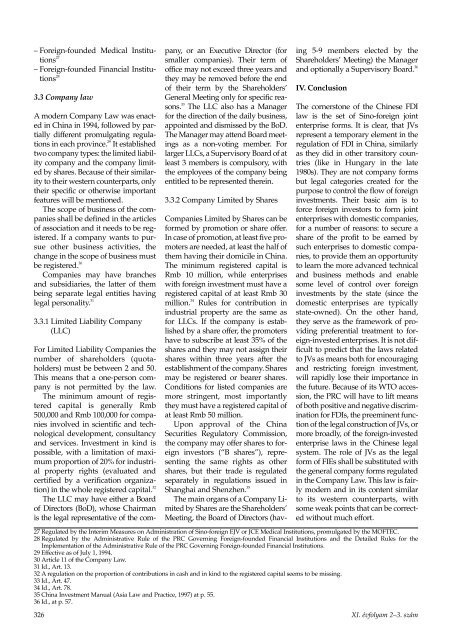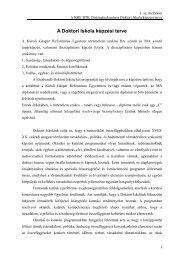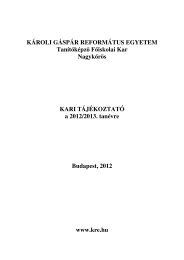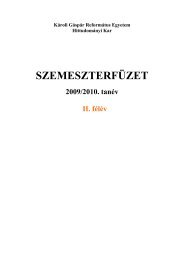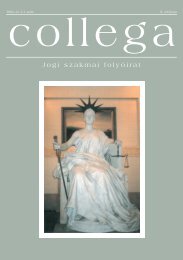collega - Károli Gáspár Református Egyetem
collega - Károli Gáspár Református Egyetem
collega - Károli Gáspár Református Egyetem
You also want an ePaper? Increase the reach of your titles
YUMPU automatically turns print PDFs into web optimized ePapers that Google loves.
– Foreign-founded Medical Institutions<br />
27<br />
– Foreign-founded Financial Institutions<br />
28<br />
3.3 Company law<br />
A modern Company Law was enacted<br />
in China in 1994, followed by partially<br />
different promulgating regulations<br />
in each province. 29 It established<br />
two company types: the limited liability<br />
company and the company limited<br />
by shares. Because of their similarity<br />
to their western counterparts, only<br />
their specific or otherwise important<br />
features will be mentioned.<br />
The scope of business of the companies<br />
shall be defined in the articles<br />
of association and it needs to be registered.<br />
If a company wants to pursue<br />
other business activities, the<br />
change in the scope of business must<br />
be registered. 30<br />
Companies may have branches<br />
and subsidiaries, the latter of them<br />
being separate legal entities having<br />
legal personality. 31<br />
3.3.1 Limited Liability Company<br />
(LLC)<br />
For Limited Liability Companies the<br />
number of shareholders (quotaholders)<br />
must be between 2 and 50.<br />
This means that a one-person company<br />
is not permitted by the law.<br />
The minimum amount of registered<br />
capital is generally Rmb<br />
500,000 and Rmb 100,000 for companies<br />
involved in scientific and technological<br />
development, consultancy<br />
and services. Investment in kind is<br />
possible, with a limitation of maximum<br />
proportion of 20% for industrial<br />
property rights (evaluated and<br />
certified by a verification organization)<br />
in the whole registered capital. 32<br />
The LLC may have either a Board<br />
of Directors (BoD), whose Chairman<br />
is the legal representative of the company,<br />
or an Executive Director (for<br />
smaller companies). Their term of<br />
office may not exceed three years and<br />
they may be removed before the end<br />
of their term by the Shareholders’<br />
General Meeting only for specific reasons.<br />
33<br />
The LLC also has a Manager<br />
for the direction of the daily business,<br />
appointed and dismissed by the BoD.<br />
The Manager may attend Board meetings<br />
as a non-voting member. For<br />
larger LLCs, a Supervisory Board of at<br />
least 3 members is compulsory, with<br />
the employees of the company being<br />
entitled to be represented therein.<br />
3.3.2 Company Limited by Shares<br />
Companies Limited by Shares can be<br />
formed by promotion or share offer.<br />
In case of promotion, at least five promoters<br />
are needed, at least the half of<br />
them having their domicile in China.<br />
The minimum registered capital is<br />
Rmb 10 million, while enterprises<br />
with foreign investment must have a<br />
registered capital of at least Rmb 30<br />
million. 34<br />
Rules for contribution in<br />
industrial property are the same as<br />
for LLCs. If the company is established<br />
by a share offer, the promoters<br />
have to subscribe at least 35% of the<br />
shares and they may not assign their<br />
shares within three years after the<br />
establishment of the company. Shares<br />
may be registered or bearer shares.<br />
Conditions for listed companies are<br />
more stringent, most importantly<br />
they must have a registered capital of<br />
at least Rmb 50 million.<br />
Upon approval of the China<br />
Securities Regulatory Commission,<br />
the company may offer shares to foreign<br />
investors (“B shares”), representing<br />
the same rights as other<br />
shares, but their trade is regulated<br />
separately in regulations issued in<br />
Shanghai and Shenzhen. 35<br />
The main organs of a Company Limited<br />
by Shares are the Shareholders’<br />
Meeting, the Board of Directors (having<br />
5-9 members elected by the<br />
Shareholders’ Meeting) the Manager<br />
and optionally a Supervisory Board. 36<br />
IV. Conclusion<br />
The cornerstone of the Chinese FDI<br />
law is the set of Sino-foreign joint<br />
enterprise forms. It is clear, that JVs<br />
represent a temporary element in the<br />
regulation of FDI in China, similarly<br />
as they did in other transitory countries<br />
(like in Hungary in the late<br />
1980s). They are not company forms<br />
but legal categories created for the<br />
purpose to control the flow of foreign<br />
investments. Their basic aim is to<br />
force foreign investors to form joint<br />
enterprises with domestic companies,<br />
for a number of reasons: to secure a<br />
share of the profit to be earned by<br />
such enterprises to domestic companies,<br />
to provide them an opportunity<br />
to learn the more advanced technical<br />
and business methods and enable<br />
some level of control over foreign<br />
investments by the state (since the<br />
domestic enterprises are typically<br />
state-owned). On the other hand,<br />
they serve as the framework of providing<br />
preferential treatment to foreign-invested<br />
enterprises. It is not difficult<br />
to predict that the laws related<br />
to JVs as means both for encouraging<br />
and restricting foreign investment,<br />
will rapidly lose their importance in<br />
the future. Because of its WTO accession,<br />
the PRC will have to lift means<br />
of both positive and negative discrimination<br />
for FDIs, the preeminent function<br />
of the legal construction of JVs, or<br />
more broadly, of the foreign-invested<br />
enterprise laws in the Chinese legal<br />
system. The role of JVs as the legal<br />
form of FIEs shall be substituted with<br />
the general company forms regulated<br />
in the Company Law. This law is fairly<br />
modern and in its content similar<br />
to its western counterparts, with<br />
some weak points that can be corrected<br />
without much effort.<br />
27 Regulated by the Interim Measures on Administration of Sino-foreign EJV or JCE Medical Institutions, promulgated by the MOFTEC.<br />
28 Regulated by the Administrative Rule of the PRC Governing Foreign-founded Financial Institutions and the Detailed Rules for the<br />
Implementation of the Administrative Rule of the PRC Governing Foreign-founded Financial Institutions.<br />
29 Effective as of July 1, 1994.<br />
30 Article 11 of the Company Law.<br />
31 Id., Art. 13.<br />
32 A regulation on the proportion of contributions in cash and in kind to the registered capital seems to be missing.<br />
33 Id., Art. 47.<br />
34 Id., Art. 78.<br />
35 China Investment Manual (Asia Law and Practice, 1997) at p. 55.<br />
36 Id., at p. 57.<br />
326 XI. évfolyam 2–3. szám


